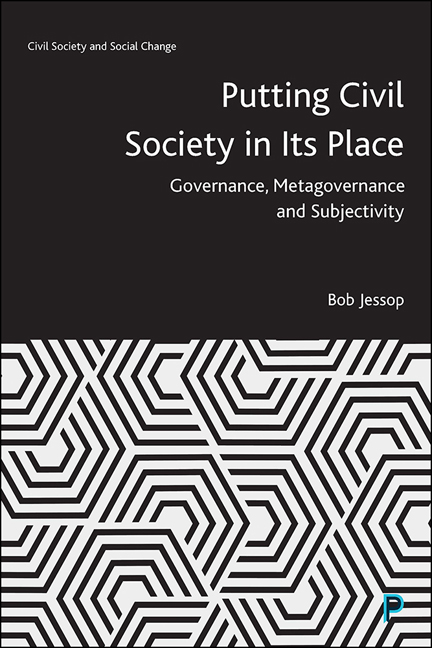Book contents
- Frontmatter
- Dedication
- Contents
- List of Tables and Figures
- Abbreviations
- Note on the Author
- Acknowledgements
- Licensing Information
- Preface
- 1 Introduction
- Part I Complexity, Contingency and Governance
- Part II Locating Civil Society as a Mode of Governance
- Part III Governance Failure and Metagovernance
- Endnotes
- References
- Index
4 - Semantic, Institutional and Spatio-Temporal Fixes
Published online by Cambridge University Press: 18 March 2021
- Frontmatter
- Dedication
- Contents
- List of Tables and Figures
- Abbreviations
- Note on the Author
- Acknowledgements
- Licensing Information
- Preface
- 1 Introduction
- Part I Complexity, Contingency and Governance
- Part II Locating Civil Society as a Mode of Governance
- Part III Governance Failure and Metagovernance
- Endnotes
- References
- Index
Summary
This chapter explores three interrelated aspects of governance. Actors must reduce the complexity of the natural and social world to ‘go on’ within it, whether as participants or observers, by selecting some aspects as more meaningful or important than others. A fortiori, this holds for the complexity of geophysical and sociospatial relations with the result that actors are forced (usually unwittingly) to approach them through spatial imaginaries that frame their spatial understandings, projects and experiences or at least, through other kinds of social imaginary that have significant spatial presuppositions and implications (cf Lefebvre, 1991 [1978] on the dialectical relations among conceived, perceived and lived space). I first introduce the idea of semantic fixes and then consider institutional and spatio-temporal fixes. The latter two have three aspects – one concerns space and time as direct objects of governance, the second addresses the task of governing the spatiotemporal dimensions of other substantive objects of governance, and the third deals with governing or compensating for the uneven spatiotemporal effects of governance, as seen in the potentially unintended consequences of governance. My analysis draws on previous work on conjunctural analysis, cultural political economy (CPE), institutional fixes and spatio-temporal fixes, but I relate them directly to governance in its various guises. Combining these approaches facilitates the study of how the inherent contradictions and antagonisms of the capital relation are governed through a historically variable set of institutional, spatio-temporal and semantic fixes.
Discourse and semantic fixes
While institutional fixes and spatio-temporal fixes are increasingly familiar terms in CPE, ‘semantic fix’ merits a brief definition in CPE terms. It refers to the sedimentation of a social imaginary that is naturalized as an appropriate object of observation, calculation, management, governance or guidance, and that thereby frames the competition, rivalries and struggles that occur within its parameters. Such fixes are never fully closed or sedimented, of course: even hegemonic imaginaries are contested from within the power bloc, often depend on complementary subhegemonic imaginaries with different sociospatial bases of support and are vulnerable to counterhegemonic economic imaginaries.
- Type
- Chapter
- Information
- Putting Civil Society in Its PlaceGovernance, Metagovernance and Subjectivity, pp. 87 - 100Publisher: Bristol University PressPrint publication year: 2020



